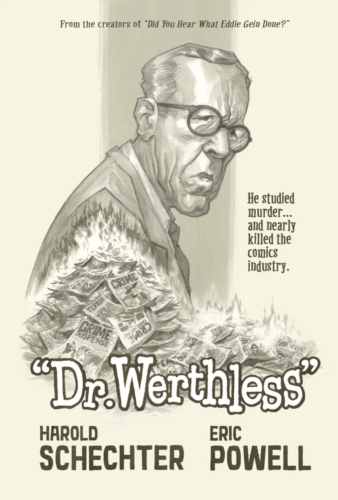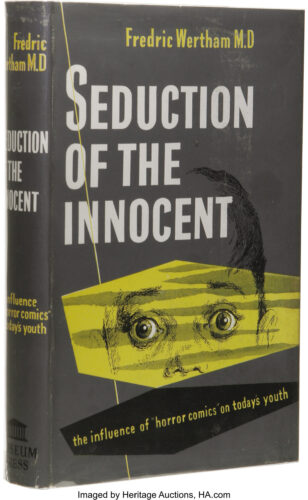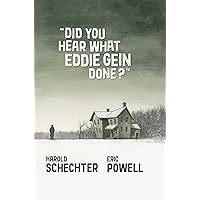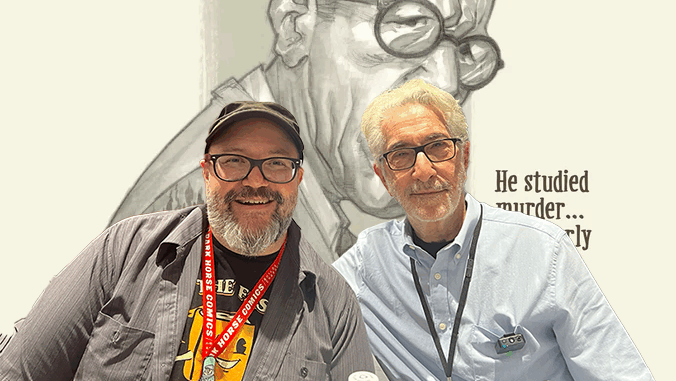
In the past year I’ve read two works confronting the legacy of Dr. Frederic Wertham, the psychiatrist whose book The Seduction of the Innocent led to censorship and a stunting of the American comic book industry by decades. One, Mark Pracht’s play The Innocence of Seduction, cast Wertham in a role similar to EC’s Crypt Keeper. But Eric Powell and Harold Schechter drew a fuller, less cartoony portrait of Wertham, exposing the tragedy of a man who actually did a lot of good but whose pride overshadowed its impact.
We sat down at Comic-Con to talk about Dr. Werthless, their latest collaboration. Powell you know from his creation The Goon, as well as his earlier Eisner-winning collaboration with true crime writer Schechter, Did You Hear What Eddie Gein Done? It was strangely calming to take a break from the chaos of the convention center floor to talk about serial killers…
Derek McCaw: We’re here to talk about your latest graphic novel from Dark Horse. Did I pick up right you’re going to do a third book? There’s a trilogy? I just finished your latest, Dr. Werthless, a few nights ago and loved it. How did you two start working together?
Eric Powell: We’re talking about (a third book). I was driving through Wisconsin and doing a book tour. I was very familiar with Harold’s book Deviant about (Ed) Gein and I just started thinking about the isolation of the place and how that contributed to his, you know, mental state. I thought it might be really interesting to do a graphic novel that focused on that side of the story. But I knew if I did a graphic novel, I would just be taking all the content from Harold’s book, so what’s the point in that?
Derek McCaw: You have honor.
Eric Powell: Yeah. Completely ripping Harold off, so I thought…
Harold Schechter: It’s happened before.
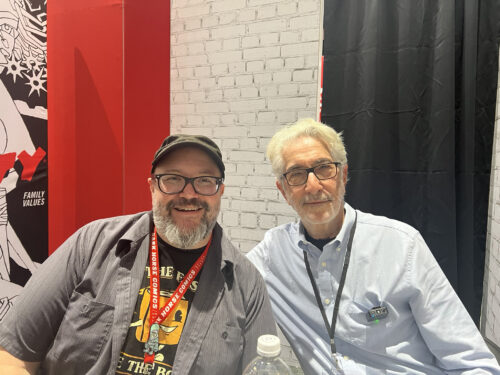
Eric Powell: The idea wouldn’t go away, so I took a shot in the dark of trying to contact him, found his agent, wrote an e-mail and was shocked that they got back to me. Harold knew who I was and was a giant comics fan. So it went from there.
Harold Schechter: That’s right. I was familiar with The Goon. I consider Eric one of, if not the greatest living American comic book artist. So when he got in touch with me it was very exciting.
Derek McCaw: I agree with what you just said because definitely Dr. Werthless, there were panels where I had this moment of “are you taking this from Tales From The Crypt?” specifically the great Jack Davis. I mean, I know your style. I’ve read most of your work, but still there were panels where I wasn’t quite sure which was I seeing: Eric or was I seeing Jack Davis. So was that conscious, or am I just reading into it as a fan?
Eric Powell: It was completely intentional. You know, I was trying to channel a lot of those EC artists in spots. Especially in the sections where I went from the pencil style I did the majority of the book in, to the pen and ink style for effect.
Derek McCaw: What surprised me about Dr. Werthless was it’s almost a tragedy; not just for comics, but for him.
Eric Powell: I think it’s 100% a tragedy. It’s a man who through his own faults and flaws kind of destroyed his legacy, which we should be talking about him as this great champion of civil rights and all his work he did for children and everything. But instead we talk about how he destroyed comics.
Derek McCaw: I’d had no idea he had been involved in civil rights. And the other interesting thing to me too is I didn’t know, like suddenly “the werewolf” is (notorious serial killer) Albert Fish. I’d never put that together. And I thought it was odd subject matter for you, Harold, until suddenly, “oh! It’s a serial killer story!”
Harold Schechter: Right. Wertham appears prominently in a couple of the true crime books I wrote. One is the Albert Fish book, and then this other book called The Mad Sculptor, about a very sensational triple murder that happened in New York City in 1937. In both cases, Wertham was called in to examine and treat these serial killers.
So I I knew a lot about Wertham. In fact, I had already gone to the Library of Congress at one point to research his papers. Although at the time I did for The Mad Sculptor, a lot of them were not yet accessible to all scholars because his wife put certain kinds of restrictions on them for 25 years after his death. So yes, I knew a lot about Wertham.
I mean, I was a big comic book fan when I was a kid. I had known about Wertham since I was a teenager. When I, and this is in air quotes, borrowed a copy of The Seduction of the Innocent from the library of a relative of mine.
In terms of the tragic aspect, there’s certainly, you know, something very sad and poignant about what happened with Wertham. Not only because he’s remembered as this villain, but just because he was really ostracized and not taken very seriously by a lot of his professional peers, partly because of his crusade against the comics. So he was always something of an outsider who is not acknowledged by the psychiatric community. At the time he also was disparaged by a lot of people in the literary community, who felt that he was missing the whole point about the imaginative importance of comic books.
Derek McCaw: And I think you did similar with Ed Gein. I mean, how much of your work do you think might be helping people think, like could we change the way people get treatment? When I read stories like that, I think, if only someone had noticed earlier, you know, and gotten this guy help. Maybe. I don’t know. I don’t know if that’s strictly a 2025 perspective.
Harold Schechter: You know, when I wrote the book Deviant, one of the things that interested me was how living there — Plainfield at the time had fewer occupants than the apartment building in the Bronx I grew up in. So you’re wondering how people in such a small environment could not know some of this stuff, and it’s one of the things I address in the book. Which is on the one hand, supposedly everybody knows everybody else’s business. But on the other hand, the only way people can maintain some sense of privacy is to deliberately try not to know all these things about their neighbors.
And again, with Gein, it was so beyond the bounds of imagination what he was doing. You know that nobody was home wondering if ol’ Ed was digging up corpses of middle-aged women and taking them home and dissecting them. But again, you could say that about many sociopaths.
You know, Charles Manson’s mother, if she didn’t dress him up as a girl? You know? And if Henry Lee Lucas’s mother didn’t skin his pet rabbit in front of him as punishment. So yeah, a lot of that is, as you said, 2025.
Derek McCaw: If you were to do a third book, is there a case you’re looking at?
Eric Powell: We have one in mind and I think it’s a lesser known crime. I think that’s all we’ll say about it.
Harold Schechter: I will say that it interweaves two related stories, one related to true crime and one related to this other significant cultural matter.
Derek McCaw: As a comic book fan, what is your favorite comic right now?
Harold Schechter: Eric has heard this story a million times. You know, I wrote a book called How to Collect Comics. I was a very serious collector of comic books back in the 60s. I had this huge collection of silver age Marvel comics. You know, I had the 1st 50 issues of Spiderman, the Fantastic Four, I mean them all.
To pay for my first divorce, I had to sell them and it was so traumatic that… first of all, I swore I’d never come to another Comic Con. I used to go to the early Comic Cons, you know, in the 70s. I gave Eric the program to the 74 Comic Con in New York City. So yeah, except for The Goon and one or two others. I don’t really collect. It was too traumatic.
Derek McCaw: I can understand that. And I want to put on the record now the one time I spoke to you before, Eric, was after my grandmother passed away, and I told you then that I think you’ve written one of the greatest lines in comics about grief.
Eric Powell: Oh. I know which line it is because I wrote it in response to my grandmother passing.
Harold Schechter: What was the line?
Eric Powell: It’s The Goon looking up at a poster of his aunt who raised him and he says, “I know that there’s one less person in this world that really loves me.”
Derek McCaw: And I have found myself quoting that a lot to friends who are grieving. So for people who look at your work and think The Goon is silly – it is silly in some places, but man, that is such a deep book. So I’m thanking you again for that line that’s gotten me through some troubled times.
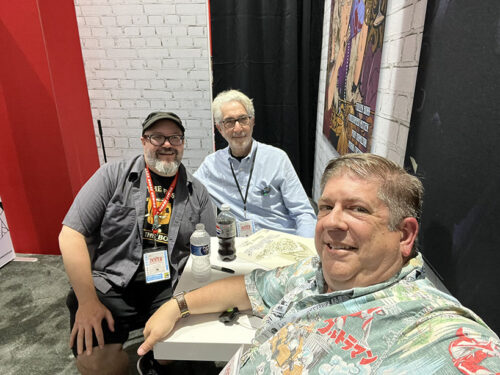
Thank you both, and you Harold, because I’ve found a whole new world of books for me to read from you.
Fanboy Planet is affiliated with Bookshop.org as well as Amazon. Purchases made through links on this and other pages may generate a commission for this site. Where possible I’ve included direct links to Bookshop.org, benefiting Mysterious Galaxy in San Diego.

